| This blog explores social attitudes in Jane Austen's time, discusses her novels, reviews forgotten 18th century novels, and throws some occasional shade at the modern academy. The introductory post is here. My "six simple questions for academics" post is here. |
| |
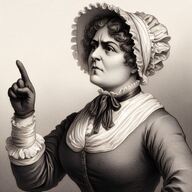 Hugh Thomson illustration of Mrs. Elton
Hugh Thomson illustration of Mrs. Elton As I mentioned, I got interested in finding examples of this comic stock character because of Mrs. Elton in Emma. It seems to me that she is an exemplar of a vulgar Bristolian, and Austen makes a point of specifying she is from Bristol, “the very heart of Bristol.”
As I find these novels, I am looking carefully for references to the slave trade and the attitude of the authors as revealed through their characters. While many a novel relies upon the sudden acquisition of a West Indian fortune as a plot device, they usually mention the West Indies without remarking on slavery at all, let alone the evils of slavery. The stereotypical Bristol merchant and his family are held up to criticism and ridicule in these novels--not because they were involved in the slave trade, but because they were vulgar and presumptuous...
Bristol traders, merchants, and bankers were portrayed in some novels as being either avaricious and miserly, as in Nobility Run Mad, or extravagant and showy, as in The Bristol Heiress. Their focus on making money was distasteful, though their fortunes were attractive to the landed gentry.
Melinda Hartley’s parents, in The History of Melinda Harley (1778), pressure her to marry Mr. Ash, “who has been a Bristol merchant, and very successful in trade, having made at least a fortune of £60,000, some call it more.” But Melinda is in love with Mr. Viner, a gentleman of modest fortune but exquisite breeding, good manners, and sound principles. In contrast, Mr. Ash “bears the character of a very honest man, but at the same time seems to have a pretty high notion of his own importance, nor has he, in my opinion, sacrificed sufficiently to the graces, without which a man maybe rich indeed, but never can be agreeable.”
Mr. Ash does not bear comparison with Mr. Viner: “in spite of the great attention shown to Mr. Ash during the time of dinner, he appeared disconcerted and out of humour, destitute of that sweetness of temper and complacency of behaviour, the fruits of a liberal education, he appears to measure his regard for people, according to the weight of their purses, or to a ready compliance with his will.”
Fortunately for Melinda, Mr. Ash dies in a hunting accident, and she marries Mr. Viner.
We don’t know if the daughter of “old square toes” was an angel, for sometimes the wives and daughters of Bristol merchants were also portrayed as being vulgar. Mary Russell Mitford’s Our Village (1824), which is still read today, mentions “the rich wife of a Bristol merchant, a tun of a woman, abounding in loud vulgar talk, and full of coarse hospitality and noisy good humour,” rather like Mrs. Jennings from Sense & Sensibility.
Author Rosalia St. Clair combines ignorance and stinginess together with ostentation in The Banker's Daughters of Bristol (1824). Mr. Milson started out as “an obscure trader. The fortune he received with Miss Osborne, and his own successful speculations, in a few years raised him to short-lived opulence, but could not give to him either the feelings or the manners of a gentleman.”
Mr. Milsom, his wife and his two daughters all love wearing extravagant finery but they also enjoy driving a hard bargain: “Mind that, girls," [says their father] "a penny saved is a penny won, as the old proverb says; had I not attended to that in my youth, I should not now have been riding in my coach and six.”
| Such were the lessons which were daily poured into the ears of the young Milsoms, and such the example by which their manners and morals were formed and fixed into habits. Milsom, besides, though vain, ostentatious, and anxious to overtop his betters, as he termed his superiors in birth and education, was at bottom the most penurious and grudging of men. To see his wife and daughters outshine lady Willoughby, Mrs. Armer, and even the duchess of D----, was his chief boast and delight; yet every guinea drawn from his pocket for this purpose wrung his heart and a vigorous account was required of the expenditure of every shilling. |
This sets the mercenary cats among the country pigeons, for Mr. Osborne is drawn in by the wiles of the oldest daughter, Jane, who “had reached that equivocal period of life when time is peculiarly precious to the aspirant for matrimonial aggrandizement,” and he marries her, to the great dismay of his children Henry and Emma.
“Had [Henry] deemed Jane Milsom calculated to render his father happy, he would have been the first to rejoice at their union; but the cold selfish character of his cousin, her vulgar manners, and ill-informed mind, he was well aware could never assimilate with the frank generous nature of his parent.”
Before long, Mr. Osborne realizes he has married a vulgar spendthrift with terrible dress sense and no education. “At the head of her husband’s table, amid the polished and high-bred society which frequented Osborne Hall, she was sadly out of place. When subjects of literature were discussed, she was dumb; if the merit of poetry, or the drama, were the subject of conversation, to her it was like babbling in an unknown tongue.—With books she was unacquainted, except that class of novels which load the shelves of a provincial circulating library….” (Yes, another author who wrote novels for circulating libraries taking a poke at novels, just as Austen discusses in Northanger Abbey. It was a common thing!)
Meanwhile, the younger sister, Maria, is jilted by an army captain. Humiliated, she makes a hasty marriage to an army surgeon. This marriage ends in disaster and she ends her days poor, sick and miserable.
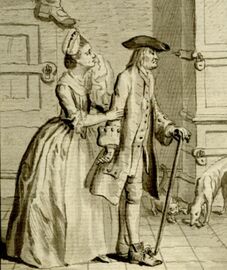 The Miser
The Miser In addition to their wealth, Bristol merchants and their families were satirized for their vulgarity and lack of taste. Charlotte Smith inflicts her heroine with a vulgar Bristol aunt, Mrs, Ludford, who dresses with more "wealth than taste" in Ethelinde, or the Recluse of the Lake (1789). The Ludfords represent people who aspire to join genteel society, but they give away their vulgar origins with everything they do and say. Clarintha, upon meeting her cousin Ethelinde, enquires: “I now hope, my dearest creature, that we shall be vastly together. I am told that you read a great deal, and play divinely; oh! Do you know, that music is the passion of my soul, and that I perfectly dote upon poetry!”
Mrs. Ludford patronizes Ethelinde because of her comparative poverty. She says "sitiation" instead of "situation" and "illconvenient" instead of "inconvenient." Her son Robert is embarrassed to be the son of a Bristol merchant. Clarintha deludes herself that a nobleman is attracted to her when in fact he's just flirting with her to amuse himself. (It should be noted that just because Smith lampoons vulgar merchants, that doesn't mean she's on the side of the high-born aristocrats. They come in for a beating in this novel, too). All the Ludfords irritate our heroine intensely and matters become worse when her father dies and she's forced to seek a home with them.
William Combe, (author of Dr. Syntax) wrote an 1784 epistolary novel in which the narrator tells of a countryside stroll where he stops to admire a “pleasing little villa.” He speaks to the gardener, who tells him the owner is a Bristol merchant. “I thought it fairy land, and wondered that a Bristol merchant… should have the taste to adorn, or the feeling to enjoy, such a paradise. But, at the very moment that such a captious and illiberal idea glanced across my mind, the master of the place appeared to offer me, in the most obliging manner, the refreshments of his house.”
This particular merchant “had been in Denmark and told me of his voyage as well as satisfied me on some commercial points, with good sense and agreeable behaviour.” So perhaps this merchant has as little to do as possible with the slave trade and is trading in herring instead.
These novels and The History of Melinda Harley tells us that the stereotype of the boorish Bristol merchant was well-established in the public mind in the eighteenth century and it lived on into the nineteenth as well. In The Heir Expectant (published in 1870 but set in the 1840s), the miserly Bristol banker, Gilbert Waters, has a fortune of one hundred and fifty thousand pounds, but cuts off his nephew Austin for marrying a woman with no money. Years later, Uncle Gilbert dies and leaves his fortune to his nephew, but only after Austin and his wife have lost several children because of living in a damp and unhealthy house.
In A Charming Fellow (1878), by Frances Trollope, the snobbish Mrs. Errington decides “to decline the Bristol merchant’s offer to employment and a home for her son. Besides Algy’s 'genius,' there were other objections. Mr. Filthorpe had a vulgar wife and a vulgar daughter. Of course they must be vulgar. That was clear. And who could say that they might not endeavour to entangle Algy in some promise, or engagement, to marry the daughter? Nay, it was very certain that they would make the endeavour. Possibly—probably—that was old Filthorpe’s real object in inviting his young relative to accept a place in his counting-house.” Frances Trollope, mother of Anthony Trollope, was a native of Bristol, though her father was a clergyman, not a merchant.
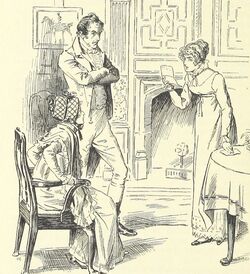 Mr. Gardiner is a sensible, cultivated, London merchant in Pride and Prejudice
Mr. Gardiner is a sensible, cultivated, London merchant in Pride and Prejudice Ferdinand Fitzormond (1805) is an exception to the rule about mentioning vulgarity but not slavery. Here the connection is made bluntly: “the widow Bembridge was the daughter and wife of a West Indian planter... one may venture, I believe, to affirm, that black was the colour of their prosperity; yet was their conduct and conscience not worse, possibly, than any other of the slave-buying or slave-whipping tribe. A brother of Mrs. Bembridge, a Bristol merchant, married a half sister of Lord B—and the young lady that has accompanied her hither, whom you saw last night, is the fruit of that union." Both Mrs. Bembridge and her niece Miss Dorville appear to be women of mixed race, so sometime I might plow through the five volumes of this novel to learn more about how they are portrayed.
Not all depictions of Bristol merchants were unflattering. In the comic play, He Lies Like Truth (1828), Merchant Truepenny is merely a straight man in a farce. His daughter's suitor, Mr. Rattler, provides the comedy. Harriet is a straightforward heroine and neither she nor her father are portrayed as being oafish or mercenary. The question of exactly how Mr. Truepenny got his pennies is also absent from the play.
In Maria Edgeworth's tale for children, Waste Not Want Not, Mr. Gresham is portrayed as an honorable man who lives well but sensibly. It's his nephew Hal, from the more genteel branch of the family, who is the careless and extravagant one.
In The Accomplished Hypocrite (1822) Emma Elliott's father is a kind and hard-working merchant, busy in his counting-house. Her mother is determined to force her into marriage with a nobleman she doesn't love. Miss Elliot is not vulgar or uneducated.
The more you look, the more you find class consciousness in Austen's novels. Austen uses Mrs. Elton's dialogue to illustrate her arriviste pretentions. Mrs. Elton frequently refers to her wealthy relatives, the Sucklings, who are perhaps one generation away from the slave trade (by the late 18th century, Liverpool had eclipsed Bristol as a center for the slave trade). The Sucklings, Mrs. Elton claims, are an “old, established” family who are dismayed by the arrival of some “upstarts” from Birmingham. “By their manners they evidently think themselves equal even to my brother, Mr. Suckling, who happens to be one of their nearest neighbours. It is infinitely too bad. Mr. Suckling, who has been eleven years a resident at Maple Grove, and whose father had it before him—I believe, at least—I am almost sure that old Mr. Suckling had completed the purchase before his death.”
The comedy here arises from the fact that someone who has had his country seat for eleven years is not considered to be at all in the same class as a family whose pedigrees stretch back for generations. Perhaps the Knightleys acquired Donwell Abbey from a Tudor monarch.
In real life, the Bristol merchant class had the reputation of being insular and of limiting acceptance into their ranks. More on that later.
Previous post: Nobility Run Mad, conclusion Next post: Real-life Bristol merchants
| In the second volume of my Mansfield Trilogy, I introduce the character of Mr. Meriweather, a wine merchant from Bristol, widowed and looking for a wife. He is not at all vulgar. More about my novels here. |
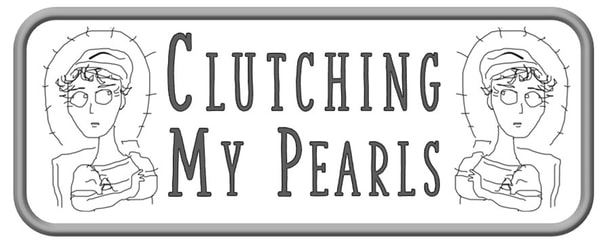
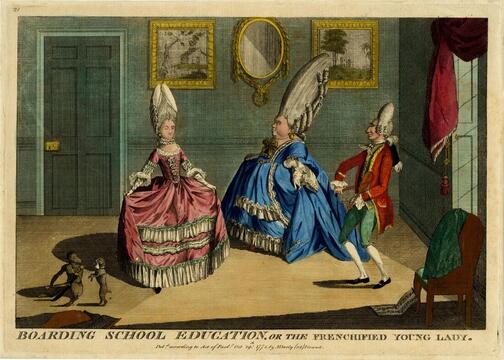
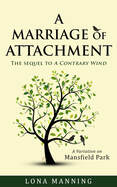
 RSS Feed
RSS Feed